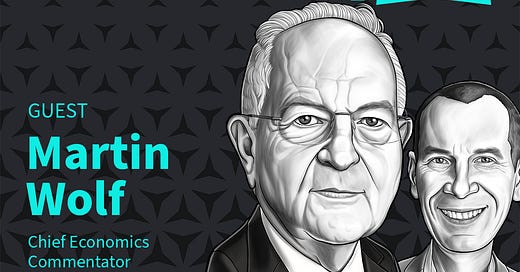Will Democracy and Capitalism Stay Married?
A fragile union has brought us freedom and prosperity, it needs support to avoid divorce
I always assumed democracy and capitalism belonged together.
After all, both rest on freedom - freedom to select who governs you and to start a business or choose a career. My guest on the most recent Ideas Lab podcast, FT Chief Economics Commentator Martin Wolf, assured me of two things. One, many people feel the same way. Two, we’re wrong.
In his new book- The Crisis Of Democratic Capitalism - Wolf argues that democracy and capitalism are “complementary opposites”. Yes, they have fit together well over the last few generations, but powerful forces are pulling them apart.
Capitalism emerged before democracy. But economic freedom didn’t precede political freedom accidentally. Capitalism unleashed forces that made democracy hard to resist. Capitalism created an urbanized workforce, many of whom grew prosperous and educated. These prosperous, educated people wanted a say in how they were governed. But Wolf also points to deeper, moral forces that applied to all people regardless of circumstance:
“If capitalism says everyone has an equal claim on the right to succeed, then it basically says individuals are valuable. And, if individuals are valuable, then it becomes quite difficult to say they should have no say in public life just because they are poor.”
And thus the link between voting and property began to fray and the slow march toward universal suffrage democracy began.
OK, what about the opposites?
On the other hand, the operation of free markets can imperil democracy. To me, it boils down to one foundational element – the tendency of capitalism to produce highly unequal economic outcomes.
Concentrated wealth creates what Wolf calls a “plutocratic elite”. The ultra-rich don’t formally have more votes, but their wealth allows them to vacation with Supreme court judges influence the political process, bend rules in their favor and, Wolf fears, eventually override democracy.
Inequality also leads a large segment of society to justifiably feel the system isn’t working for them. Autocrats can exploit this discontent, undoing democracy in the name of protecting “the people”, either from some insidious internal threat (the woke mob!) or evil foreigners.
I wrote about the fragilities of capitalism last year. Wolf has given it a lot more thought and devotes the second half of his book to explaining how capitalism and democracy can escape these dangerous outcomes.
I like the practicality of his approach. He avoids advocating revolutionary change, instead suggesting a variety of piecemeal reforms. Sadly, a nice revolutionary idea is way easier to summarize in a Substack post than piecemeal reforms, especially given my “1,000 words or less” New Year’s resolution.
Fair and balanced?
So, in lieu of trying to package his recommendations into a few paragraphs, I’ll address feedback I received when the podcast came out. Some listeners thought that our conversation was “controversial” and “one-sided” in that there was a lot of criticism of Trump and the Republican party.
Wolf illustrated his fears by pointing out that the leader of a country he believes saved democracy from perishing in World War II lied about, and then actively sought to overthrow, the 2020 election. That’s not controversial, it happened.
It also didn’t feel controversial when Wolf noted that only a very few – 10 out of 211 House Republicans - voted to impeach Trump for doing this. When almost all the elected representatives of one of America’s main political parties do not think attempting to overturn an election is an impeachable offense, it hardly seems contentious to claim democracy is at risk.
And yet…it is fair to say our conversation did not cover Wolf’s criticisms of the American left. And that is the fault of the host (Moi) not the guest. Wolf’s book is not one-sided and makes important points about how the left needs to reform, particularly with respect to its attitudes about patriotism and citizenship.
Democracy relies on patriotism
Democracy depends on the willingness to accept rule by people you don’t like with ideas you despise. Why do we accept that?
Because citizens share some common attachment to place, history, values and culture. Patriotism is an expression of pride in this common identity and, viewed in this way, is essential for democracy to work.
Wolf acknowledges that some, perhaps quite a lot, of these patriotic attributes are based on myths. But myths are a universal attribute of human societies. He urges the left to embrace fellow citizens who are openly and enthusiastically patriotic.
Citizenship is special
Since shared history and culture are critical, immigration is going to feel threatening to some citizens. It is a mistake not to acknowledge the legitimacy of this feeling. It is downright dangerous to label those who feel this way “deplorable”, or worse.
Democracy is exclusive. Political rights accrue to citizens. Human rights apply to everyone but there are differences and it’s wrong to downplay this.
Any book that tackles politics and economics in a balanced way is bound to contain ideas that you disagree with. Indeed, as I read Wolf’s book, I found myself arguing with him in my head, particularly when he says it’s not clear America will be a functioning democracy by the end of the decade. I had pages of notes prepared to debate this assertion and we tackled some of them in the podcast.
He listened, responded and in the end said simply:
“I may be being alarmist, I probably am being alarmist. But all I can say is that it’s better to be alarmist than complacent.”
You might also like:
The Post-Global Economy Will Be Better Than You've Been Told



